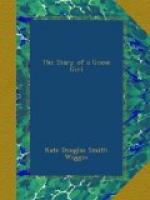The afternoon session of the conference was most exciting, for we reached the subject of imported eggs, an industry that is assuming terrifying proportions. The London hotel egg comes from Denmark, it seems,—I should think by sailing vessel, not steamer, but I may be wrong. After we had settled that the British Hen should be protected and encouraged, and agreed solemnly to abstain from Danish eggs in any form, and made a resolution stating that our loyalty to Queen Alexandra would remain undiminished, we argued the subject of hen diet. There was a great difference of opinion here and the discussion was heated; the honorary treasurer standing for pulped mangold and flint grit, the chair insisting on barley meal and randans, while one eloquent young woman declared, to loud cries of “’Ear, ’ear!” that rice pudding and bone chips produce more eggs to the square hen than any other sort of food. Impassioned orators arose here and there in the audience demanding recognition for beef scraps, charcoal, round corn or buckwheat. Foods were regarded from various standpoints: as general invigorators, growth assisters, and egg producers. A very handsome young farmer carried off final honours, and proved to the satisfaction of all the feminine poultry-raisers that green young hog bones fresh cut in the Banner Bone Breaker (of which he was the agent) possessed a nutritive value not to be expressed in human language.
Phoebe was distinctly nervous when I rose to say a few words on poultry breeding, announcing as my topic “Mothers, Stepmothers, Foster-Mothers, and Incubators.” Protected by the consciousness that no one in the assemblage could possibly know me, I made a distinct success in my maiden speech; indeed, I somewhat overshot the mark, for the Countess in the chair sent me a note asking me to dine with her that evening. I suppressed the note and took Phoebe away before the proceedings were finished, vanishing from the scene of my triumphs like a veiled prophet.
Just as we were passing out the door we paused to hear the report of a special committee whose chairman read the following resolutions:—
Whereas,—It has pleased the Almighty to remove from our midst our greatest Rose Comb Buff Orpington fancier and esteemed friend, Albert Edward Sheridain; therefore be it
Resolved,—That the next edition of our catalogue contain an illustrated memorial page in his honour and
Resolved,—That the Rose Comb Buff Orpington Club extend to the bereaved family their heartfelt sympathy.
The handsome young farmer followed us out to our trap, invited us to attend the next meeting of the R. C. B. O. Club, of which he was the secretary, and asked if I were intending to “show.” I introduced Phoebe as the senior partner, and she concealed the fact that we possessed but one Buff Orpington, and he was a sad “invaleed” not suitable for exhibition. The farmer’s expression




